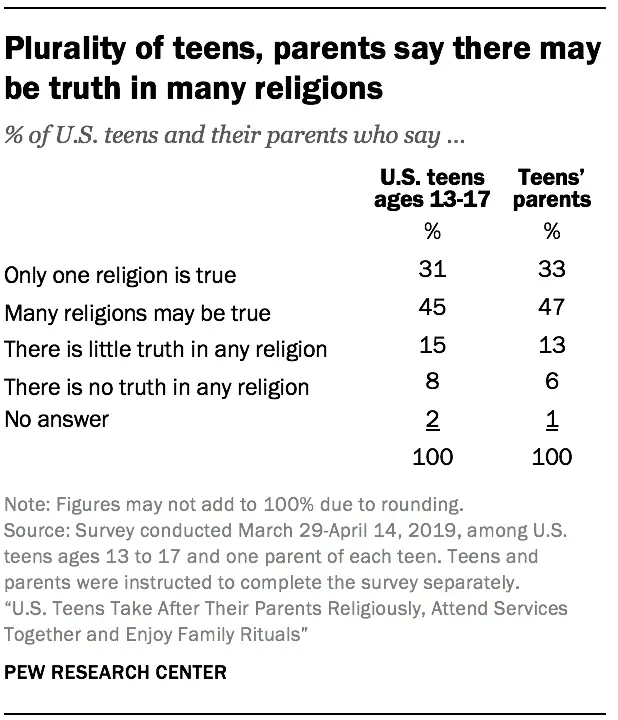WASHINGTON (BP) – The largest portion of teenagers in the U.S. believe that more than one religion may be true, Pew Research said in its latest revelation from a study of the religious beliefs and practices of teens and their parents.
Among 13- to 17-year-old teenagers, 45 percent believe many religions may be true, far outpacing the 31 percent who believe only one religion is true, Pew said. A much smaller portion, 15 percent, believe there is little to no truth in any religion, and 8 percent believe no religion is true.
Pew included a teenager and a parent from each household surveyed, and found that the religious beliefs of teenagers largely mirrored those of their parents. The largest portion, 47 percent, of parents included in the study said many religions may be true, compared to 33 percent who expressed an exclusivist view of religion, and 19 percent who said there is little or no truth in any religion.
When divided by religious affiliation, evangelical Protestant teenagers registered the largest portion of respondents, 66 percent, who believe in one religion, compared to 28 percent of the subset who believe many religions may be true, Pew said.
A majority, 57 percent, of respondents who identified as mainline Protestant told Pew they believe many religions may be true, compared to 28 percent of mainliners who believe only one religion is true. Catholic responders more closely mirrored mainline Protestants, with 54 percent of Catholic teens professing many religions may be true, and 31 percent saying only one religion is true. Among teens in the study who professed no religious affiliation, 6 percent said only one religion is true, and 46 percent said many religions may be true.
Regional differences also hold, with the largest group of teenagers expressing a pluralistic view of religious truth, 61 percent, residing in the Northeast, Pew said. Only 16 percent of teens in the Northeast are exclusivist, and 12 percent said there is little truth in any religion. Elsewhere, 36 percent of Southern teens said only one religion is true, 41 percent said many religions may be true, and 14 percent said there is little truth in any religion.
In the Midwest, 28 percent of teens believe only one religion is true, compared to 51 percent who believe many may be true. Others in the Midwest believe there is little or no truth in any religion. Western teens were more evenly split, with 37 percent saying many religions may be true, 34 percent saying only one religion is true, and 28 percent saying there is little or no truth in any religion.
Pew has previously released other findings from the study conducted March 29 to April 14, 2019, among 1,811 pairs of teens and one of their parents. Eligibility of adults to participate was based on whether they were the parent of a teenager between 13 and 17.
Results cited here do not necessarily equal 100, as some respondents did not answer all survey questions. Findings are accessible here.
This article was written by Diana Chandler and was originally published at baptistpress.com.

